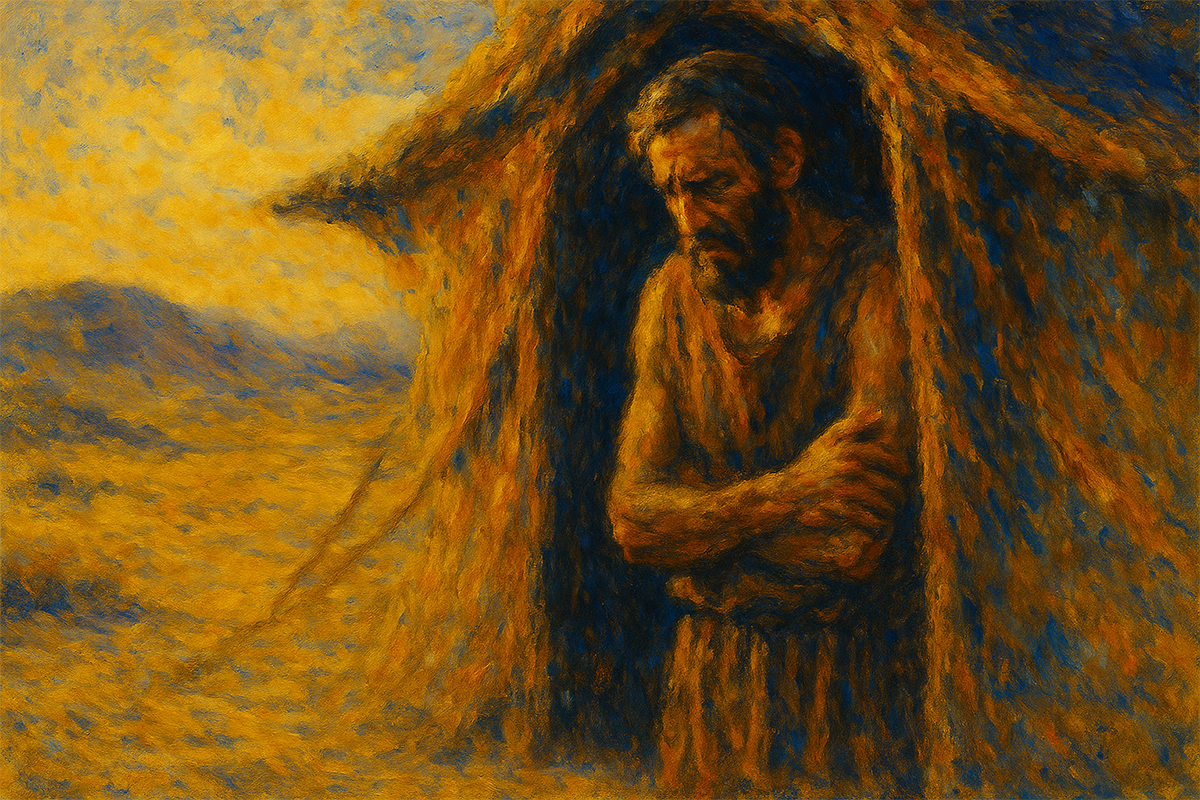The Enemies of Love
Love is not seized by striving—it is received by faith, stronger than death, the birthright no famine or foe can steal. Jacob learned this when he surrendered Benjamin; letting go of control, he found grace and the gift of love restored.

Adapted from the Sunday Preaching of August 9, 2025
The Core Ambition
There is nothing we should be more intent upon than realizing God’s love in our lives. We all fall short of this, yet it must remain our core ambition and commitment.
“We know that we have passed from death to life, because we love the brethren” (1 John 3:14).
So, John suggests that loving the brethren is impossible apart from leaving the framework, matrix, and culture of death and entering the framework, matrix, and culture of the kingdom and of life. Thus does love become the proof of our new situation in the new kingdom.
Love is not merely a feeling, a sentiment, or a romance. Love is the willingness to lay down one’s life for another.
“By this we know love, because He laid down His life for us. And we ought to lay down our lives for the brethren” (1 John 3:16).
Love is the new commandment we have been given, and it fulfills the Law of Christ, summing up all the Law and the Prophets.
The Enemies of Love
1. Hatred
Hatred is the most obvious enemy.
“He who hates his brother is a murderer, and you know that no murderer has eternal life abiding in him” (1 John 3:15).
A person who yields to the supernatural power of hate has not merely failed to pass from death to life—he has driven all life from himself. There's no more sure way to be certain of a dreadful eternity than to live a life guided, fueled, and driven by hate. Eternal life is not just a future destination; it is a reality meant to dwell within us here and now. And if we yield to hate, we expel eternal life from our own hearts.
2. Fear
Fear, too, is an enemy of love.
“He who fears has not been perfected in love . . . perfect love casts out fear” (1 John 4:18).
Many say they cannot be perfect in love, but John’s point is that the one who fears has not yet discovered mature love—the kind God gives that is greater than fear. Scripture consistently contrasts immature love with mature love.
“Greater love has no one than this, than to lay down one’s life for his friends” (John 15:13).
Is this greater love the same as perfect or mature love? I believe so. Likewise, Paul—writing in the great love chapter—calls love “the greatest of these” (1 Cor. 13:13) and directly contrasts it with immaturity:
“When I was a child, I spoke as a child, . . . but when I became a man, I put away childish things” (1 Cor. 13:11).
Mature love puts away childish self-protection and embraces the self-giving that marks perfect love.
3. Pride
Pride is a profound foe because love demands vulnerability, and pride refuses it. Pride demands the feeling of love, the rewards of love, and the trust that true love earns—yet it will not pay love’s price.
Unlike Paul, who stood before the church “in weakness, in fear, and in much trembling” (1 Cor. 2:3), pride insists on standing in self-confidence, in strength, in arrogance—whether in the church, in marriage, or in friendship. Pride is the great saboteur, cheating us out of love’s reward even while demanding it the loudest.
Pride seeks love on a false foundation—deservedness. It strives to achieve love, not as a gift from God through others and for others, but as a wage earned, an achievement won. Yet if love is not a gift of grace, it is not of God. If it is a gift from God, what right have we to extort or demand it? We are recipients of unmerited love, and this should produce in us courage, willingness—even eagerness—to give ourselves as He gave Himself for us.
Faith and the Risk of Love
If love is a gift from God, it cannot be separated from faith.
“…faith working through love” (Gal. 5:6).
Faith is critical because it answers the risk factor in love. The faith that overcomes self-protection, fear, and excessive caution is not faith in our own goodness or in another’s worthiness, but faith in the goodness of God.
Thus, our love for others becomes payment, not on a debt we owe them, but on the infinite debt we owe to God. Our courage to be vulnerable—knowing we may be betrayed, stabbed, or wounded—is not leveraged against confidence that others will not hurt us, but against the unshakable confidence that “your labor is not in vain in the Lord” (1 Cor. 15:58).
No matter how people treat the treasure of love we give, it falls—not into the void—but into the reservoir of God’s grace. As my father said, every drop of love given in faith goes into that reservoir. Even when it seems to miss its mark or fail in its imagined purpose, it is not lost—it accumulates in the great ocean of God’s goodness. Somewhere, sometime, for someone in a desert, that love will rise as a spring of grace in their time of need.
As my father also said, we do not look down the rifle sights of obedience, calculating, “I will love like this to get that.” That is transactional love. We love like this because we have been loved. My love for you is a payment to Him for a debt I could never repay.
The Call to Examine Ourselves
Look into your heart and life and consider which of these three—hatred, fear, or pride—most threatens the flow of God’s love through you. His love for others is the reason you were born. It is your cause, your calling, your mission, your means, your end—everything. Anything that takes the place of this foundational empowerment to love is a counterfeit.
When searching for your calling and mission, close your eyes and picture the moment you expire, lying dead upon your bed. Then imagine what your living soul can gather up in its arms and carry with it into eternity. Whatever cannot be carried through the gates of heaven is not your calling, purpose, or mission. It is not worth consuming your time or torturing your mind. What you can carry is the love that never fails (1 Cor. 13:8), that is stronger than death (Song 8:6), that many waters cannot quench (Song 8:7), and that rises from the grave of human assault, lies, and destruction to ascend to the God who gave it. That which is of love is eternal; everything else will fail.
The Hardest Choice
The hardest thing in life is to know you need something, to know you do not have it, to feel time running out—yet to choose to stop grasping for it through the very efforts of the flesh that alienate you from it.
You know you need purpose. You know you need the high calling of love. You feel shame knocking and failure calling your name. You want some epic move to prove your life mattered. God put that hunger in you. The ticking clock is meant to force decisions, revisions, convictions, and provisions.
But the enemy’s trick is to make you double down on the same methods that have brought failure—telling yourself that if you just try harder this time, it will work. There can be no redemption or breakthrough until you honestly diagnose the problem. The problem is this: you rely on works, while God offers the miracle through grace. You trust in what you can achieve, prove, control, or manipulate, while the treasure, hope, and life come only as a gift.
A gift cannot be snatched from the counter, bought with effort, stolen with an army, or extorted with threats. It must be given. But you can cultivate the attitude God delights to endow—the humility, trust, surrender, and faith that draw His hand to give. The birthright you seek belongs to a certain disposition you have not yet become. It is never too late to fall on the Rock in surrender and become the one for whom the birthright is given.
Jacob’s Struggle
Jacob loved his birthright but saw it through the lens of competition with his brother. He thought it was merely about securing a blessing from Isaac before his death. His true birthright was learning to trust God—passing through the narrow birth canal of agonizing trust into a new reality where anxiety is replaced by joy, fretting by gratitude, and life becomes a gift instead of a grind of striving and manipulation.
Jacob felt cheated. He had the birthright, yet his family was fractured, and there was no peace. Fixing his hopes on Joseph as the means of his legacy only put a target on the boy, and he was destroyed by competition. When he believed Joseph dead, he held his bloody garment in his hands and wept bitterly.
Have you ever felt that as soon as you set your sights on your blessing, it died—and you were left holding the torn, bloodied cloak of your plans?
But Jacob did not surrender in faith. He only recalculated and fixed his hopes on Benjamin, thinking, “This is how I’ll secure my future, escape obscurity, and make my life matter.”
Then famine came. His sons wanted to go to Egypt; Jacob resisted. He feared Egypt and wanted to stay in the land of promise, but he had no answer, no food, no grace. The patriarch of provision became the patriarch of prevention, blocking his family from the salvation they needed.
This man, who once had confidence in his stock, servants, and wealth—who had even used the gods of pagans to help him scheme and grasp—was now at the end of Achievement Road. And where does that road end? In a desert. The Promised Land becomes barren when inhabited by achievement instead of faith.
The Surrender of Benjamin
Jacob stood in his tent, starving in the land that was supposed to be his inheritance, still thinking it was all about him. He finally let his sons go to Egypt, and they returned, asking for the one thing he still clung to—Benjamin.
Was it a coincidence? Or was the God of all mercy showing that the very act of clinging was what was blocking the flow of grace? Benjamin was the second son upon whom Jacob had set his affections, his second attempt at achieving a legacy through his own plans. He held out as long as he could.
How powerful our instincts against surrender. How stubbornly we cling to our achievements, our plans, and—above all—our control.
At last, the hunger grew so severe that Jacob faced the choice: let his family perish in the sands or let go. Trembling, hurt, and angry, he stood in the mouth of his tent and cried out to God:
“All these things are against me; . . . my days have been few and full of trouble” (Gen. 42:36; 47:9).
What he did not see was that his trouble was rooted in never having truly surrendered—seeing God’s plan but trying to execute it through the cunning, manipulation, and strength of the flesh.
In his mind, it was all still about him: “All these things are against me.” The truth was the opposite—he was against the way God intended to bring His purpose to birth. Yet in that moment of trembling and frustration, he made the choice to release Benjamin.
He thought he was letting go of his dream, his son, his future. In reality, he was releasing the very thing that had been frustrating grace his entire life. He did not know that in letting go of Benjamin, he would receive him back—and Joseph, too, as one raised from the dead.
The Bible portrays the resurrection of love that Jacob was destined to realize on the other side of letting go—of surrendering to the God who gives, in place of the grasping conniver.
“So Joseph made ready his chariot and went up to Goshen to meet his father Israel; and he presented himself to him, and fell on his neck and wept on his neck a good while.
And Israel said to Joseph, ‘Now let me die, since I have seen your face, because you are still alive!’” (Gen. 46:29–30).
Yes—the same Jacob who thought he had lost his beloved Joseph, and then Benjamin as well—would discover grandsons he had never even dreamed existed.
“Then Israel saw Joseph's sons, and said, ‘Who are these?’ And Joseph said to his father, ‘They are my sons, whom God has given me in this place.’ And he said, ‘Please bring them to me, and I will bless them.’ Now the eyes of Israel were dim with age, so that he could not see. Then Joseph brought them near him, and he kissed them and embraced them. And Israel said to Joseph, ‘I had not thought to see your face; but in fact, God has also shown me your offspring!’ So Joseph brought them from beside his knees, and he bowed down with his face to the earth” (Gen. 48:8–12).
And this was the Jacob who, in the summation of his prophetic blessings, could finally confess:
“I have waited for Your salvation, O LORD!”
The Problem of Control
Control is the core issue. The father who tries to hold life together by harshness, screaming, and threats is nothing more than a scared man grasping at threads spinning away from him. The one who cloaks manipulation in syrupy sweetness is doing the same thing with different tools. One is dismissed as fake; the other rightly rejected as abusive. Both are driven by control.
If you are a father, no one needs to see you stripped to nothing, raging at God at the mouth of your tent as if all life revolved around you. If you are going to lead, lead in surrender, in trust, in faith—in “considering Him faithful who promised” (Heb. 11:11). Look at a situation that appears as good as dead and refuse to grow weak in faith.
Instead, grow strong, saying:
“I may be old, but I am stronger in trust than I was last year, because I believe more in God’s goodness” (Rom. 4:19–20).
That is the leadership people need: the example of letting go, trusting God, and refusing to be the pitiful control freak. Shake your fist at the empty grain bins if you must, but then stretch out your hands and let Another lead you where you would not go (John 21:18).
And you will discover that what He was after all along was love—but love that is a gift from God, not a wage earned.
The Gift of Love Restored
Love you thought was dead may yet live. Children you thought were lost may yet return. But it must be a gift, not the product of your striving.
At the end of his life, Jacob understood that to “persevere with God” (Gen. 32:28) was not to cling desperately to his old ways, but to let the crises and reductions of life bring him into the joy of release. In letting go, he became the man for whom the birthright had been decreed, discovering that the birthright itself was grace.
Standing at the doorway of failure, you can try to control your children into loving you, force them to like you, manipulate them with guilt—or you can confess:
“If I have lost anything, it’s my fault. I own it.”
And then say:
“But You, Lord, are the God who gives life to the dead and calls things which do not exist as though they did. So call out to our brokenness, and we will answer” (Rom. 4:17).
I will love—not for what I can get, but in gratitude for what I have already received. I will love as an act of faith, and my faith is not that others will not fail me, but that You will never fail me (Heb. 13:5). I cannot let go of control until I trust the One to whom I am letting go.
Acknowledge it: if you have not believed in His goodness, have not meditated on His mercy, have forgotten the sins from which you were cleansed (2 Pet. 1:9), and have failed to make a full sacrifice because you lost sight of His mercy (Rom. 12:1). But in view of that mercy, you can begin to live as a giver—freely giving because you have freely received (Matt. 10:8). This is your birthright: to inherit grace.
The Birthright of Grace
Ask yourself: Does grace define my relationships, my conversations, my attitudes, and my seasons of loss, sickness, or aging? If so, I have found my birthright—and no one can steal it—for it is a gift, and not just any gift, but one given by God Himself. If I have been robbed, it was not by Him. If I have been left broken by the roadside, still “Jesus Christ is the same yesterday, today, and forever,” and He has promised, “I will never leave you nor forsake you” (Heb. 13:5, 8).
If hatred poisons the heart, fear locks it shut, and pride guards it with armed suspicion, then only the humility of faith can break the siege. The love God calls us to is not born of our worthiness, sustained by our control, or measured by our success. It is His own love—poured into us, refined through surrender, and proven when we lay our lives down. In the end, the measure of life is not whether we have avoided loss, pain, or betrayal, but whether we have learned to love as those who have been loved. This alone endures—never fails—the birthright of grace that no famine, failure, or foe can take away, because it flows from the God whose love is stronger than death, a divine flame that many waters cannot quench (Song 8:6–7).





